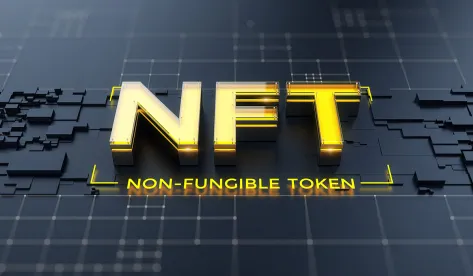In what is widely touted as the first of its kind in the UK, a recent order made in D’Aloia v Persons Unknown & Others by the High Court marks an expansion of the potential methods for service of claims permitted for English proceedings, by allowing proceedings to be served via airdrop of Non-Fungible Token (NFT). The decision marks a useful step forward for victims of fraud in the crypto-asset space.
Background to the Claim
In overview, the claimant, Mr Fabrizio D’Aloia, made deposits of cryptocurrencies (USDT and USDC) from his pre-existing wallets to the wallets of persons unknown, operating an imitation brokerage website “www.tda-finan.com” masquerading as TD Ameritrade. Mr D’Aloia thought he was trading using facilities provided by tda-finan, but the evidence suggested he had been fraudulently induced into making deposits for the purposes of those trades by persons unknown.
By the time Mr D’Aloia became aware of what had happened, the account with tda-finan recorded the value of his investment as zero. The crypto-assets he had initially transferred to trade with had been transferred to a number of private wallets. Mr D’Aloia was able to identify, through intelligence investigators, that the sums had been transferred to accounts with exchanges operated by, or under the control of, six of the defendants.
The Court, having been satisfied from the investigative evidence that there was a serious issue to be tried, decided to grant Mr D’Aloia’s application for urgent injunctive relief and allowed service of court documents out of the jurisdiction via alternative means. Importantly, this included service over a blockchain via NFT airdrop, into the two “wallets” where the misappropriated funds had initially been deposited.
What Does This Mean and Why Does This Matter?
The rules governing service of English court proceedings (set out at Part 6 of the Civil Procedure Rules) predominantly anticipate physical delivery of hard copy documents. That process does not easily translate to the electronic, decentralised world of crypto-assets. Under the current rules, even service by email requires prior agreement or the Court’s permission.
By issuing and granting this order for service via NFT, the Court has sent a clear message to would-be applicants: the English court is willing to embrace technology and cater for new developments if that enables genuine claims to be brought efficiently (service via social media has also been permitted in appropriate cases). Recent developments, including this case, have shown that the English Court will not shy away from applying established legal principles to enable claims involving crypto-assets to be pursued in this jurisdiction.
Ultimately, the service rules are concerned with making defendants to claims aware of the claim against them. In that context, allowing service over the blockchain via an NFT makes sense, given it has the nature and effect of instantaneous delivery of information in real time and was considered by the Court to be “likely to lead to a greater prospect of those who are behind the tda-finan website being put on notice of the making of this order, and the commencement of these proceedings”.
Utilising alternative service via NFT is particularly useful for victims of crypto-fraud given that the identity of fraudsters is often unknown and unseen. The wallet into which funds were transferred may be one of the only points of contact the prospective claimant had with the fraudsters. By being able to utilise the wallets involved with the suspected fraud, this problematic hurdle can be avoided, at least at the service stage. That said, alternative service such as via NFT will not negate the need to investigate and see what information can be obtained on the identity and location of your prospective defendants. It is worth noting that the Court was prepared to grant service via NFT alongside service to the email address which had been used to communicate with Mr D’Aloia, but did not think it would be sufficient to make that order without serving by email as well.
This is unlikely to be the last case of service by NFT we see, although it may be a while before claimants will be able to use this method as a part of standard practice without the need of reverting to the Courts for written permission to serve. As long as claimants are taking steps to identify how they can effectively put defendants on notice, it seems likely that they will find an attentive ear with the Courts for the mechanism they ultimately seek to adopt.
Crypto Exchanges as Constructive Trustee
The novelty of service by NFT is not the only point of note in this decision. In granting the applications sought by Mr D’Aloia in this case, the Court concluded that there was a good arguable case against the crypto-exchanges for liability as constructive trustee. While this is a finding made in the context of an initial, without notice application, it is a potentially significant development in the liability of crypto-exchanges where misappropriated property can be traced to their exchange, as well as identifying a useful route for recovery for victims of crypto-fraud. It will be important to see how the Courts answer this question in future cases.




 />i
/>i

